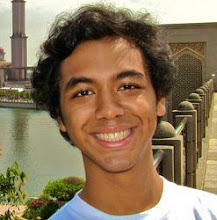My last post about the TransJakarta was purely unpolitical. It should remain so unless Fauzi Bowo decides to sue me, which would create a deluge of support from our presidential candidates. Then I would reek of politics. However, let’s not waste our time pondering about this hypothetical event and let’s puzzle ourselves with the workings of this presidential election campaign.
According to my personal history, this campaign season features the first real debates among presidential and vice-presidential candidates, organized by the General Elections Committee (KPU). The first of five presidential debates took place on June 18. It was widely considered as a flop: although all went well, the debate itself was tedious and not so enlightening. It mysteriously didn’t have a real debating session, only 90 minutes of one-way blabbity-blab snoozefest and 30 minutes of commercials. Ironically for a “debate”, Indonesians couldn’t see their would-be leader express their thoughts, showcase their critical thinking abilities, argue against each other, and compete for the top spot. In short, they spent 2 hours on something that they could have done on YouTube, like what the Queen has done – and leave Britney alone.
As if that was not horrible enough, the criticism was met with the lamest defense one could construct. Some say that debates in which candidates go for an all-out attack are too “American”; others claim that a heated debate goes against “Indonesian culture” as Indonesians follow “Eastern customs”. Concerned commentators defend the debate format on the grounds that it’s the only way to prevent unruly exchange between the candidates, colloquially known as debat kusir. Nevertheless, SBY was the one who dropped ‘da bomb. He said that debates don’t have to follow the American format because we have our own culture, that attacking other candidates only happens in the US, and that candidates should prioritize substance and solidarity over aggression.
Dear Leader, I beg you to stop right there! The things he -and also the others- said were too wrong on too many levels. In this post, I will attempt to answer those accusations and clear the image of debating. There will be less comedy here, sorry.
For a start, someone could take the article I refer to in the previous paragraph and upload it to FailBlog.org with the title “Debate Concept FAIL”. Wiktionary defines debate as “an argument or discussion, usually in an ordered or formal setting, often with more than two people, generally ending with a vote or other decision”; “an informal and spirited but generally civil discussion of opposing views; “discussion of opposing views”. Basically, there must be arguments for and against something. Additionally, every argument will generate a rebuttal from its opponents. Statistics will be thrown around, so will philosophy and ideology. Why?
For a presidential debate, it means each candidate needs to convince the audience, voters, that she or he is the right person for the job. They must expound on the values they believe in and how those values will translate into concrete action. A debate should be the moment where candidates can clearly differentiate herself/himself from the competition. For example, all three of them could promise accessible and affordable healthcare for all Indonesians. Without a debate, that statement is as essential as JK is tall. Thus, the debate is a chance to elaborate how the candidate is going to achieve accessible and affordable healthcare for all Indonesians. In the process, he/she must also point out what makes their plan better and others’ flawed.
That being said, the dreaded “aggression” is actually nothing to fear. Debaters don’t slap or claw each other, and neither do they gouge each other’s eyes out. In any proper debate, arguments never equates to personal attacks or baseless accusations. Instead, arguments should contain logic, rhetoric, and data. That is where the audience can see the values and beliefs the candidates hold, and decide whether it suits them or not. I admit, nevertheless, that since Indonesia’s democracy is still evolving, some debates will not be so different from debat kusir. Yet, that is a step we all have to take. We must not sacrifice our future by stifling the development of real debates.
Last, I find that the “Indonesian culture”/”Eastern customs” excuse is too clichéd. Which part of the culture are we dealing with? Most Indonesians are expected to be courteous and discreet, and perhaps some people thought that a debate is not so Indonesian. That couldn’t be farther from the truth because as I have described earlier, a debater must boast himself/herself and refute the opponent elegantly. In fact, the Indonesian version of decision making called musyawarah untuk mufakat naturally demands opposing sides to debate what’s good and what’s bad so that they can reach a deal. Looking at the big picture, the “Indonesian culture”/”Eastern customs” argument is ridiculously abstract and overused – people use this to cut off all kinds of progress.
To conclude, I hope that the next presidential debates, not only for 2009 but also for all future elections, will be more like a real, educated debate. A debate is never rude or un-Indonesian. Voters are tired of absurd promises of heaven and we should make our choices according to how we want our beloved country to be run by the next government.



No comments:
Post a Comment